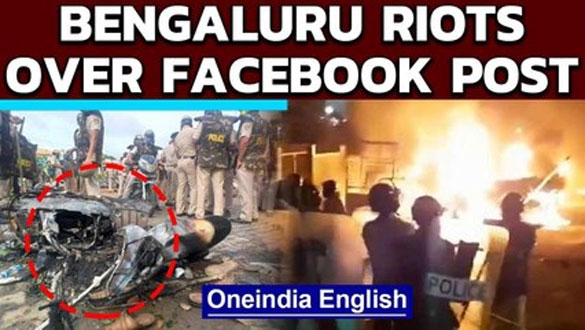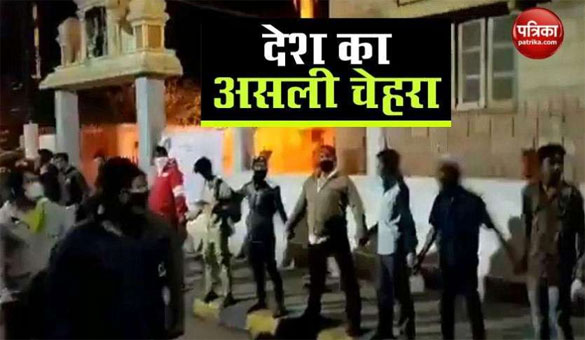Bengaluru Muslim Violence: There Is A Need to Question the Islamic Theological Consensus on Blasphemy

By
Arshad Alam, New Age Islam
12 August
2020
Muslims in Bengaluru have rioted over a Facebook post which denigrated the prophet of Islam. The post has since been taken down, the person who wrote it has been arrested but not before valuable property was destroyed and three people lost their lives. It is reported that the mob tried to burn down the house of the ‘accused’, a Dalit and a relative of the local Congress MLA. All hopes of a Dalit Muslim unity, so eagerly desired by some, went up in flames. There will be enough people who would spin this to argue that the Muslim anger was not just against the denigration of the prophet, but more so because a low caste person did this. No matter how much Muslims deny this accusation, the fact remains that casteism in their society makes them no different from other religious groups.
Also Read: Blasphemy Law has NO Qur’anic Basis

According to police, a crowd of almost a thousand people gathered in
front of the KG Halli police station demanding that a Congress MLA's relative
named Naveen be arrested.
-----
The
incident comes days after the Bhoomi Pujan of Ram temple in Ayodhya.
Many proclaimed this event as heralding the establishment of Hindu Raj in India
and were visibly and understandably concerned over the future of Muslims. And
yet the riotous mob in Bengaluru have shown no sensitivity to the changed
political contexts in which Muslims find themselves today. This is certainly
not the image of the ‘fearful Muslim’ which some would like to portray. Granted
that Muslim sentiments had been hurt, but there are better ways to show their
grievances. A little sagacity would have only helped the community.
It is
important not to see this incident as an aberration. Muslims have always been
assertive on issues which concern their faith. Whether it is the demand to ban
Salman Rushdie’s book or whether it is the question of physically assaulting
Taslima Nasreen and throwing her out of West Bengal, Muslims have successfully
pressurised various governments to concede to their religious demands. One
should not forget that the biggest agitation of Muslims in post-independence
India was during the Shah Bano issue when the Muslim clergy forced the
parliament to annul a progressive ruling of Supreme Court. It is another matter
that Muslims have never agitated and rallied to demand education and jobs and
have hardly participated in other civil struggles. Muslim priorities have
always been very clear in this country.
Those who
are rationalising the Bengaluru violence as a result of ‘frustration in the
last six years’, have no understanding of Muslim politics. They need to realise
that what happened in that city is part of a pattern of political behaviour
which Muslims have always exhibited. There is certainly no need to pin this
down to the excesses of last six years. They must remember that there was no
BJP government when Muslims launched the Shah Bano agitation.
Also Read: How Islamic Are ‘Islamic’ Blasphemy Laws?

Every
religion is sacrosanct to its believers. But all religions do not behave in the
same way when anyone denigrates their faith or symbol. Jesus has been written
about and depicted in all possible ways and yet we do not see Christians
burning properties every time such a thing happens. For a long time, Hinduism
never reacted violently to any perceived denigration within the multiplicity of
its faiths. Semitic Hinduism, however, has made it a point to react (at times
violently), especially when Muslims or Christians are the ‘denigrators.
Muslims, however, have always reacted to such incidents as if it is their
calling. It is as if they do not show their anger physically, then they will
become lesser Muslims.

Young men are seen holding hands and ensuring that rioters didn’t attack
the temple located in in DJ Halli police station limits in the city.
-----
The problem
is that the dominant Islamic theology actually expects Muslims to behave this
way. Although the Quran is ambiguous regarding the penalty for blasphemy,
certain verses have been read to legitimize the killing of blasphemer. Then
there are Hadith on which there is scholarly consensus that such people who
denigrate the prophet should be killed. It is not surprising therefore that of
all the countries where committing blasphemy warrants the death penalty, almost
all happen to Muslim countries. Within these countries, a large number of
minorities, Muslims and others, have been punished under such laws. In fact,
such laws have been designed to specifically target minorities. An allegation
of blasphemy is all that it takes to put the accused in deep trouble. It is
this religious sanction for such type of behaviour that needs to be questioned.
Certainly,
the situation was very different in Bengaluru. No one was calling for the
killing of the accused. They were simply protesting for lodging an FIR which
the police refused initially. The irate mob then vented its anger on nearby
properties and a police station. The police, in trying to quell the
disturbance, ended up killing three Muslim protestors. We all know that
disproportionately more numbers of Muslims get felled by the police bullet,
everywhere in India. Given this statistic, Muslims should have been cautious
and should have staged a peaceful protest. But then, as we know and have come
to expect, Muslims tend to lose all rational faculty when Prophet’s dignity and
honour is in question. It is this sudden and instinctual reaction which needs
to be questioned and challenged. How else do we understand this reaction if not
by the fact there is widespread sanction and theological legitimacy for
it?
It is
heartening to note that Muslims have come up with alternate interpretations of
theological traditions and are arguing that the Prophet himself would have
disapproved of such violence. They are reminding Muslims how Muhammad forgave
those who always disparaged him. However, all these interpretations will remain
on the pages of twitter and Facebook. In the real world, the Muslim imagination
and actions are largely shaped by the Ulama and their madrasas. Till the time
they are not confronted with such alternative interpretations, nothing much is
going to change.
Amidst the
mob frenzy, it appears that some Muslims wanted to attack a local Hindu temple.
They were thwarted by other Muslims, who made a human chain to protect the
temple. This is a sobering example that even in the middle of such religious
madness, humanity and empathy can survive. Clearly then, these Muslims must be
drawing very different lessons from Islam. It is such readings of Islam which
should eventually become the dominant reading within Muslim societies.
Arshad
Alam is a columnist with NewAgeIslam.com
URL: https://www.newageislam.com/islam-politics/bengaluru-muslim-violence-there-need/d/122608
New
Age Islam, Islam Online, Islamic Website, African
Muslim News, Arab
World News, South
Asia News, Indian
Muslim News, World
Muslim News, Women
in Islam, Islamic
Feminism, Arab
Women, Women
In Arab, Islamophobia
in America, Muslim
Women in West, Islam
Women and Feminism
